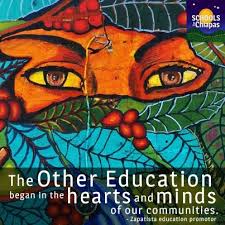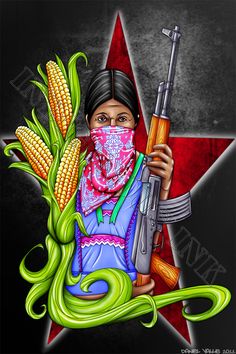The Zapatista Revolution
El Fuego y La Palabra
the Fire and the Word

2000
Zapatismo —This century’s turning-over time is an extraordinary movement against privatization and privilege, where uncertainty is the only certainty.
Reframe the notion of Revolution as the improvisational journey, not the frozen utopia.
Live in the time of creation. This is the power of consciousness, in the enactments of daily life. Not so much a question of how to create the world as how to keep alive the moment of creation, in which creation never ends and we help support it and keep it alive. The power of being creators in a world who’s hopefulness lies in its unfinishedness, it’s openness to improvisation and participation. Hope is no longer fixed on the future, but shining in a fierce present. We are the creators, living in the time of creation.
Find meaning in reclaiming agency in the moment, in the space where you are standing. Doing is filled with meaning.
HOPE — The present is wide open in the defense of hope. Hope is about power that lies on the edges, in the shadows, with forgotten and discounted ordinary people. It is the power of the powerless that can lead us out of this.
What started as a classic guerrilla war changed into an army that listened first to a new teacher: the Indigenous people.
STRATEGY — Not a Movement, but movement. Rejecting all manifestoes of hierarchy for deep community and absolute democracy in relationships. That prevent authority from rising. A unique military strategy based more on words than weapons, on listening, rather than speaking.
A constantly reinvented dream: humble and universal.
Like water: not like watertight- undermining all that’s fixed and rigid with fluidity, constantly moving and dissolving.
Insurrection is the honorable way: to be one person who hasn’t been conquered.
Inventing a better politic of means and ends. Putting the means before the ends. A politics of process, putting context in front of ideology.
State power is about burocracies, alienating hierarchies; a long way from the societies we want to create. The state is a form of social organization the negates self determination. Communion between people liberates us. Autonomy without permission.
Beyond binary logic. And with a huge varieties of allies accommodating many issues, perspectives, open to new networks of power. Joyously impure, circulating and dissolving certainties. Uncertainty is the only certainty.
POWER- Freedom from power is the end goal of their revolution. Taking power has always been the goal- taking control of the future, but letting go may be the most powerful thing we can do. Let go. Walk away from power and find freedom.
The aim of revolution is to fundamentally change the relations of power. The question of who controls the state is not the focus of attention. This is a politics of prefiguration, a revolution in the nature of revolution. Not an ideology, but an intuition. A reactivation of potential for direct intervention into the heart of the process and the heart of the world, in daily life, where doing is filled with meaning.
Zappatismo is creating new norms of progressive behavior, and new leftist postures: transparent, self critical, defending feminism and the queer communities of Mexico.
New and ancient symbols and languages. Distinct in its history composition, tactics and global significance from anything that came before.
They say legitimate leaders are those who obey orders from the people they govern. They use horizontal structures, bound to the will of the community.
Zappatismo is an attempt to create a political space in which to build alternatives to ownership. At the same time, they opened up Real space in the land the multinationals wanted.
A revolution that makes revolution possible. A struggle to create a world in which many worlds fit. A war, not for power, but to be heard, fought behind masks that allow the rebels to be seen, masks are symbols of solidarity with the other faceless of the world, condemned to oblivion under globalization.
They fought the government for 2 days, then changed into a pacifist organization at the will of the people an autonomous municipalities. Twelve days of war followed by fourteen years of theater.
Their solidarity movement is their indigenous weapon. They’ve resisted subsidies and infrastructure projects and they refuse to support any political party. They have simply turned their backs on the state.
They’ve built remote centers for national and international civil society activists to share their experiences with the rebels. Alternative systems of justice, according to indigenous justice, not money. They’ve developed an indigenous economy, a solidarity economy, rooted in the tradition of peasant farmers working collectively for the community. Zappatismo is constructing their own world with cultural values opposed to those of neoliberalism.
Being human means we constantly drive towards the creation of our own humanity.
We assume full responsibility for our own humanity. They dare to dream what is so hard to imagine in this world— Hope. Inspiration. Solidarity. Dignity.
Hope lies in all things that point against and beyond capitalist social relations.
Refusal comes first. Then grounding that refusal in alternative creation.
We make capitalism every day; we need to start unmaking it. Look to those who are developing an alternative society.
What has protected the Zapatistas is not so much that they are an army, but the depth of their social relations of support—their base of affection. For their struggle to be strong, they have to overcome the separation of politics from everyday life. How can we understand rebellion to be an everyday feature of people’s lives? How is struggle rooted in everyday experience?

Zapatista
Who owns history? What do we mean when we say Revolution?
We march and we want it to change
We want the world saved so that we can go home
But it’s always too soon to go home
History isn’t an army marching forward
It’s drips of water changing stone
Hope is a door or the vision of a door
While we wave the flag and clutch the cross
Older symbols arise to the south
There are Mayan poets in southern Mexico
Writing radical chapters of history in their masks in their mountains
Imagine an army melting into a jungle of poetry and theater
Rebellion means telling other stories
Outside of history books they’re changing history
What does it mean to be one person who hasn’t been conquered?
When every other revolution was about seizing power from the state
They turn their backs on the state and face instead
The sacred details of their days
Forget about reorganizing this nightmare
Caracoles
A caracole is the Zappatista’s symbol—a snail shell. The viral spiral may provide a solution to revolution’s solutions. The snail spirals outwards, backwards, inwards.
The snail, so different than the eagle, symbol of both the US and Mexico, a predator who attacks from above. The slow, quiet snail. The slow revolution which may start like lightening but is realized patiently, slowly, steadily.
The snail moves slowly.
Walking slowly, we ask questions. Away from mistakes, asking questions. Loving questions. Slowly towards old ways and small things. We teach our children our language to keep alive our grandmothers.”
Prophets of a half born world in which many worlds are possible where the people govern and the government obeys.
Rebellion gifts them with a model and a language—to reimagine land, liberty, economy, possibilities. Armed with words as well as guns, metamorphosis through poetry: images fruited from imaginations ripe with 500 years of struggle.
Their memory is long. Their environment is rich. Five autonomous communities have been re-named CARACOLES. This image of the snail’s vivid vitality vs. the groundlessness of capitalism is powerful. The spiral represents entering into the heart, which is Knowledge according to the old ones. Listen to how they speak: “They say that they say that they said…”
Connecting backwards, caracoles are doors to enter into communities and for the communities to come out. Are the windows to see us inside, and for us to see outside. Caracoles are loudspeaker spiral structures to send our words far and wide and to hear the words from those far away.
Beginning from the heart, they exit to walk in the world, asking questions. They spiral like hope to remake the new society. We carry seeds under siege.
Zappatismo is broad coalitions spanning great differences with inventive bridges of reinvented witnesses. We are their shield and their witness to protect the fire and the word.
The purpose of Zappatismo is not to trade one government for another, but to have the discipline to reach beyond the state and create, and reinvent— family, gender, food systems, work, housing, and language. To create a world where leaders are irrelevant and everyday life is what matters. To restore the balance, Zapatismo is an everyday creation of resistance and rebellion.
*all quotes are from Comandante Marcos
Reclaiming the Commons
The history of capitalism has been one of enclosures, and the history of our struggles and resistance has been a reclaiming of the commons.
The global justice movement is about defending the rights, property, and values that were once held in common for all, and are today being systematically stolen and destroyed.
The Zapatistas were able to open a political space because they were able to recoup territorial space from which to launch their rebellion.
In Latin America, the commons already existed as an historical concept.
In the U.S. we have a system built on the opposite concept: private property where everything is owned by someone. This is one of the most basic elements of US political culture.
So ubiquitous we don’t even notice it: What Empire? What Commons? In the U.S. it’s very hard to see the Commons, for the Empire blocks and denies our understanding of shared space.
We have national parks, where we pay to walk, and national forests who’s job is to sell timber to corporations and permits to private citizens to destroy public lives.
The world around us is so abstract and the commons so very real: more real than money or credit cards of the dowjones or consumer logos.
Capitalism encloses life in an invisible way: fences are replaced by consumer culture. We’re raised in a commodified world where nothing is free of control.
How can we express legally and institutionally what indigenous people express ritually? The commons movement exists is the US in the realm of environmentalism, media activism, and social justice.
What can liberate private space? Reclaiming the streets protests. Critical mass bike rides. Community gardens. Cooperatives. Public art and street theater. Mass demonstrations and civil disobedience.
Declaring genetically modified free zones. Squatting. Laws protecting air, water and species. Organize!

back to list
